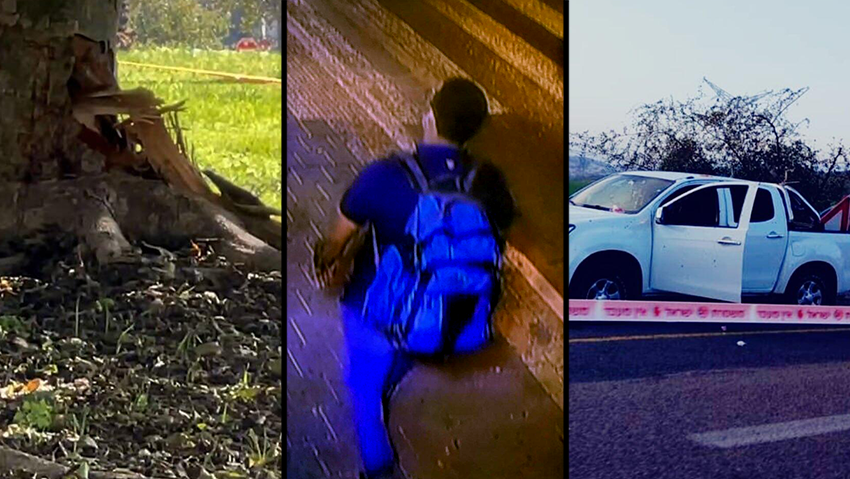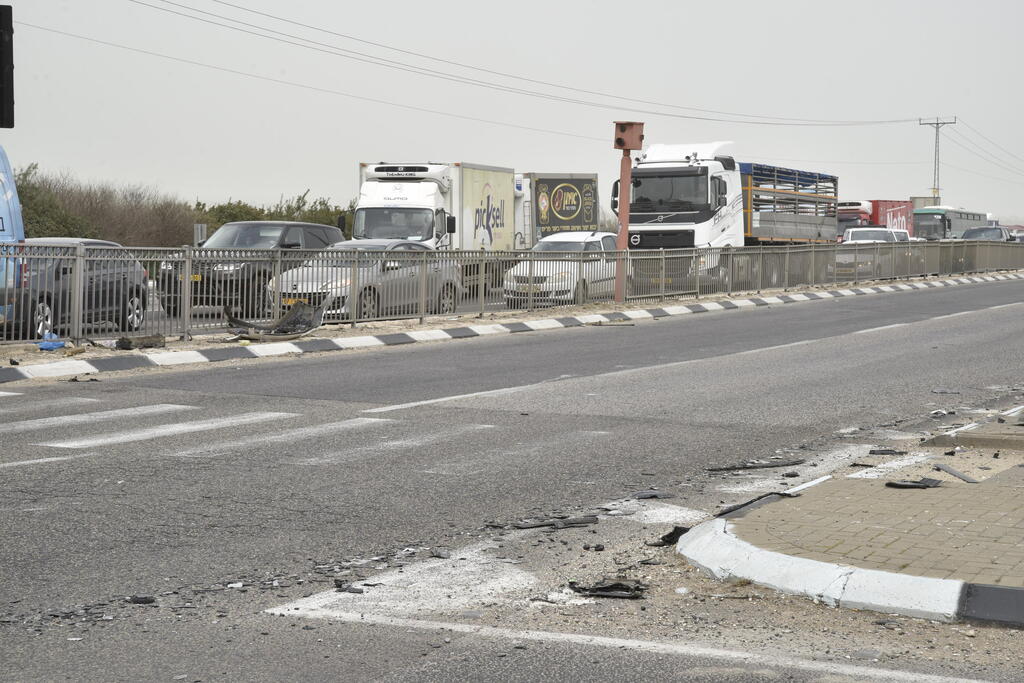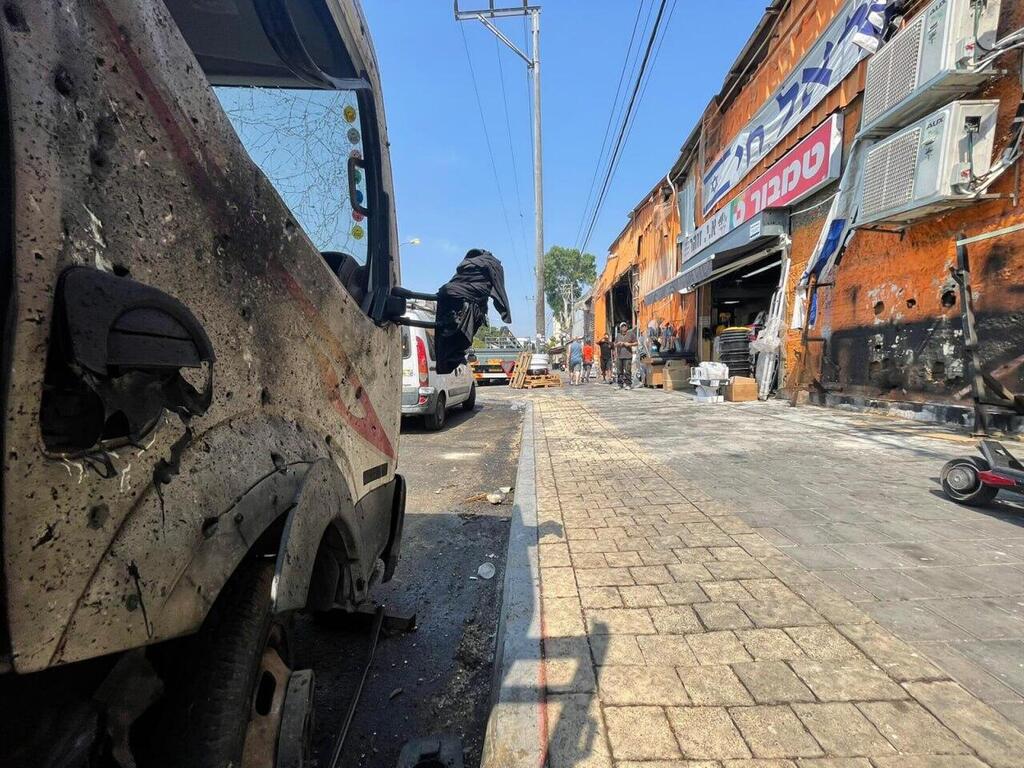August 18, 2024: A powerful explosion by a terrorist carrying an explosive device in southern Tel Aviv moderately injured a passerby riding a scooter. September 15, 2023, the eve of Rosh Hashanah: An explosion shakes Yarkon Park – fortunately, there are no casualties. March 13, 2023: An explosive device detonates at the Megiddo Junction in the Jezreel Valley, severely injuring a young man who happened to be passing by in his vehicle. What all these incidents have in common is that they were terrorist attacks, which miraculously ended without fatalities.
Responsibility for Sunday night's attack in southern Tel Aviv was jointly claimed on Monday by Hamas and Islamic Jihad. The security establishment is currently refraining from assigning responsibility to either of the terror groups, despite their claims, and is investigating whether another party was behind sending the terrorist.
The terrorist, a resident of the Nablus area, carried a powerful explosive device and detonated it not far from a synagogue. Only one person was moderately injured, while the terrorist was killed, and an investigation is looking in to whether there was any malfunction that caused the device to explode before the terrorist reached a particular target.
The attack renews concerns about the return of terrorist bombing attacks into areas inside the Green Line, many years after the devastating attacks of the second intifada. In fact, this fear has already somewhat materialized in the unusual sequence of events described above. Sunday night's attack in Tel Aviv and the attacks in Yarkon Park and Megiddo Junction last year are joined by the double bombing attack at bus stations in Jerusalem in November 2022, in which 16-year-old Aryeh Schupak and 50-year-old Tedessa Teshuma were murdered. The security system works tirelessly to thwart terrorist infrastructures and organizations within the Green Line and in the West Bank and, although it has successfully prevented numerous attacks and disasters, the success rate is not absolute.
In March 2023, the attack occurred at the Megiddo junction – a terrorist act carried out by a Hezbollah terrorist who managed to breach the border from Lebanon without being caught, reaching a junction located 70 km south of the border. He activated a standard "Kalimgor" explosive device there, which severely injured Sharaf al-Din Hamaisi, a resident of Salem, who was driving home from work. The terrorist attempted to return to Lebanon and nearly succeeded: he was stopped a few kilometers from the border and neutralized.
Six months later, the explosion occurred in Yarkon Park, on the eve of Rosh Hashanah, causing panic in the area but, fortunately, no injuries. It is also suspected to have occurred for nationalist reasons, and as evidence of the significant concern it raised – within hours, the National Counterterrorism Unit arrested two suspects in a vehicle on Highway 431, in front of the eyes of many stunned drivers. The vehicle was also scanned by sappers to rule out the presence of another device, and nearby drivers were asked to move away. Several indictments were later filed in the explosion, which was defined as "hostile terrorist activity."
Scene of the latest attack in Tel Aviv
(Video: Kobi Kuankas)
The terrorist who detonated an explosive on Sunday night in Tel Aviv, carried a powerful bomb, which detonated not far from a synagogue where a prayer service was taking place at the time. "A great miracle happened here, a few more meters and we would have woken up to a huge disaster," said Police Spokesman Deputy Commissioner Eli Levy Monday morning.
The passerby who was injured while passing by on a scooter said Monday morning from the hospital: "Suddenly there was a huge explosion, and I flew off the scooter. I thought a gas balloon had exploded because I saw the explosion was close to a truck. It felt like in a movie, a huge explosion and I was in the middle of the flames. They told me several times in the hospital that I was saved by luck, that I only have a few holes."
The Israel Police and Shin Bet announced Monday morning that, following the attack, it was decided to raise the alert level and conduct "extensive searches."
"The Israel Police continues to conduct intensified operational activities in crowded places in collaboration with special units and volunteer response teams to provide citizens with security and a sense of security. We urge citizens to remain vigilant and report any suspicious person/object to the Israel Police and call the 100 hotline," the police said in a statement.
The terrorist who was killed in the explosion was identified as a Palestinian from the West Bank's Nablus area and, a few months ago in March, an attack in central Israel was thwarted, also planned by a terrorist from the West Bank. The terrorist, from the Jenin area, carried an explosive device and was neutralized in the village of Zita area near Tulkarm. He was not previously known to the security system, but due to certain actions, suspicion arose that he was on his way to carry out an attack. Another incident occurred just five days ago, in the Hebron area, where a car bomb prepared by terrorists allegedly to execute an attack exploded. In the explosion, two of the terrorists were seriously injured, and the security system is still investigating the incident.
The recent attacks occur against the background of the already present, and even increasing, phenomenon of terrorist explosives in the West Bank, and now the fear is that there will be a "spillover" into cities in central Israel. At the end of June and the beginning of July, soldiers Sgt. Maj. (res.) Yehuda Geto and Capt. Alon Sacgiu were killed days apart in attacks using explosives during operations in the refugee camps in Tulkarm and Jenin. Last month, three explosive devices also detonated near the security fence in the Gilboa area. Two contractors from the Ministry of Defense were lightly injured in that attack.
The use of explosives in the West Bank has increased in recent years, with many being constructed from non-standard and improvised materials. Sometimes, terrorists use teenagers to transport the materials from which the improvised explosives are assembled, so they are not caught. Israeli forces, which have been operating with increased intensity to eradicate terrorism in the West Bank since the outbreak of the war in Gaza, repeatedly encounter improvised explosive devices – but also bombs with large amounts of explosive materials buried underground, beneath traffic routes.
Hamas and Iran constantly fuel explosive terrorism, attempting to introduce numerous and varied weapons into the West Bank and Israel – especially through the eastern border with Jordan, and for this purpose the IDF has strengthened its forces in the area and placed emphasis on the border. Recently, it was revealed that in March, a Palestinian living in Jordan was arrested in Nablus by the Shin Bet and National Counterterrorism Unit. The Shin Bet noted he was recruited by Hamas headquarters in Turkey that planned the thwarted attack – and that a 26-lbs. shrapnel device was also seized.
Iran, which these days promises retaliation for the assassinations of Hamas leader Ismail Haniyeh in Tehran and Hezbollah official Fuad Shukr in Beirut, is also trying to encourage terrorism by funneling money to terrorists. The IDF recently expressed concern about attempts by Iran or Hamas to introduce "game-changing weapons" into the West Bank. Evidence of this came in March this year when the smuggling of advanced weapons originating from Iran, intended for the West Bank, was thwarted with Shin Bet.
Among other things, rockets, shrapnel devices, mines, and RPG launchers were seized. Fifty pistols, 33 M4 rifles, explosives, 13 anti-tank missiles, and 25 hand grenades were also seized. According to the security system, the Iranian elements responsible for that smuggling attempt are members of the Special Operations Division of the Revolutionary Guards, headed by Jawad Afari, the former commander of the Quds Force in Syria.
Many smuggling attempts, as mentioned, are made through the border with Jordan, and in July of last year, a case focused on suspected attempts to smuggle explosive devices intended to reach the terrorist organizations in the West Bank was revealed on Ynet. The investigation then revealed that the explosives probably arrived in Jordan via a Hezbollah route originating in Iran.
A month later, another case of arms smuggling into Israel was revealed, also via the Hezbollah-Iran route: four residents of Kafr Qasim and Lod were then charged with receiving Iranian-made explosive devices and other weapons and, according to Shin Bet, one of them was in contact with the terrorist organization from Lebanon. The purpose of the explosives in that case was suspected to be criminal – the elimination of Arab crime leaders – but the smuggling route also serves terrorist elements. The investigation revealed that Iran actually supplies standard and large explosive devices to Arab crime organizations in Israel.
In September 2023, another case was revealed, in which indictments were filed against two Israeli Arabs for involvement in smuggling explosive charges and munitions through the Jordanian border. According to the indictment, the defendants acted for financial gain – a payment of $5,380 – but one of them agreed to it despite knowing that the person who sent him to fetch the weapons was an operative of the Islamic Jihad. The two were arrested in August last year by the police at the entrance to Kafr Qasim, while they were headed toward the Nur Shams refugee camp in Tulkarm.
Israeli security forces, primarily Shin Bet and IDF, are continually engaged in preempting terrorist attacks before they can be executed. Shin Bet dedicates substantial resources to locating the terrorists themselves and identifying smuggling routes. Recently, IDF has also taken direct action against those manufacturing explosive devices to reduce their use and production as much as possible.
However, prevention is not foolproof. In recent months, the defense establishment has also warned of a potential surge in attempted terrorist attacks if the Palestinian Authority, whose economic situation is deteriorating, collapses – amid various government actions against it. Additionally, the phenomenon of nationalist crime against Palestinians in the West Bank heightens concerns about escalation in this region.






